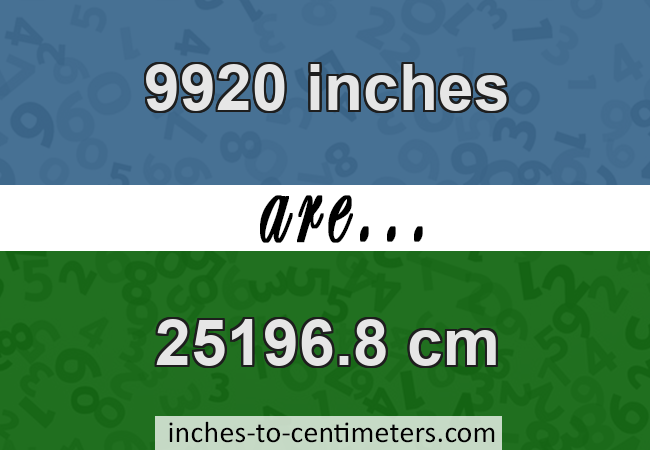To convert 9920 inches to cm, multiply the length in inches by 2.54
Formula:
9920 in x 2.54 cm = 25196.8 cm
How long is 9920 inches?
To convert inches to centimeters, you can use the following conversion:
1 inch = 2.54 cm
One inch equals 2.54 centimeters, so 9920 inches will equal 25196.8 cm.
If we have a measurement given in inches and want to convert it to centimeters, we can multiply that measurement in inches by 2.54.
This relationship is used to convert length measurements between imperial units and metric units.
To convert a measurement in inches to centimeters, first convert the feet to inches using the formula above. Then, add the number of inches to the result to get the total number of inches. Finally, multiply the total number of inches by 2.54 to convert the measurement to centimeters.
How many cm is 9920″?
There are 2.54 centimeters in one inch, so 9920 inches is equal to 9920″ x 2.54cm = 25196.8 centimeters
Conversion from Nine Thousand Nine Hundred Twenty Inch to Centimeters
The conversion factor from inches to centimeters is 2.54. Knowing this, all you need is a calculator to convert to 9920 inches. Or better yet: you calculate in your head. No matter how you do the conversion, the result should be as follows:
9920″ equals 25196.8 centimeters
9920 Inches to CM Conversion Table
| IN | CM | Conversion |
|---|---|---|
| 9919.5 | 25195.53 | 9919.5 inches to cm |
| 9919.6 | 25195.784 | 9919.6 inches to cm |
| 9919.7 | 25196.038 | 9919.7 inches to cm |
| 9919.8 | 25196.292 | 9919.8 inches to cm |
| 9919.9 | 25196.546 | 9919.9 inches to cm |
| 9920 | 25196.8 | 9920 inches to cm |
| 9920.1 | 25197.054 | 9920.1 inches to cm |
| 9920.2 | 25197.308 | 9920.2 inches to cm |
| 9920.3 | 25197.562 | 9920.3 inches to cm |
| 9920.4 | 25197.816 | 9920.4 inches to cm |
| 9920.5 | 25198.07 | 9920.5 inches to cm |
Conversions near 9920 inches
This conversion table provides the conversions between inches (in) and meters (cm) for quick and easy reference.
| IN | CM | Conversion |
|---|---|---|
| 9910 | 25171.4 | 9910 in to cm |
| 9911 | 25173.94 | 9911 in to cm |
| 9912 | 25176.48 | 9912 in to cm |
| 9913 | 25179.02 | 9913 in to cm |
| 9914 | 25181.56 | 9914 in to cm |
| 9915 | 25184.1 | 9915 in to cm |
| 9916 | 25186.64 | 9916 in to cm |
| 9917 | 25189.18 | 9917 in to cm |
| 9918 | 25191.72 | 9918 in to cm |
| 9919 | 25194.26 | 9919 in to cm |
| 9920 | 25196.8 | 9920 in to cm |
| 9921 | 25199.34 | 9921 in to cm |
| 9922 | 25201.88 | 9922 in to cm |
| 9923 | 25204.42 | 9923 in to cm |
| 9924 | 25206.96 | 9924 in to cm |
| 9925 | 25209.5 | 9925 in to cm |
| 9926 | 25212.04 | 9926 in to cm |
| 9927 | 25214.58 | 9927 in to cm |
| 9928 | 25217.12 | 9928 in to cm |
| 9929 | 25219.66 | 9929 in to cm |
| 9930 | 25222.2 | 9930 in to cm |
Definition of Inch
The inch is part of the Anglo-American System of Measurement used in the US, Canada, and the Caribbean. It is derived from the width of a thumb or finger and is denoted by ” or “in.” Additionally, it is also utilized for technical products such as screen diagonals and screw sizes in other countries.
Definition of Centimeter
The Metric System defines the meter as the fundamental unit of distance, from which the Centimeter is derived. The abbreviation for the Centimeter is “cm”. It is equal to 0.01 meters, or 10 millimeters, and is a standard unit of measurement worldwide.
Other questions solved about 9920 inches
- What is the conversion rate for inches to centimeters, and how does it apply to the conversion of 9920 inches to centimeters?
- Can you provide an example of how to use the formula for converting inches to centimeters with 9920 inches as the starting value?
- How many centimeters are equal to 9920 inches according to the conversion factor?
- What is the numerical value of the conversion rate for inches to centimeters when applied to 9920 inches?
- How many centimeters are equal to 9920 inches according to the conversion factor?
- How do I apply the conversion factor for inches to centimeters to calculate the equivalent measurement in centimeters for 9920 inches?
- What is the equivalent length of 9920 inches in the metric system, in centimeters?

